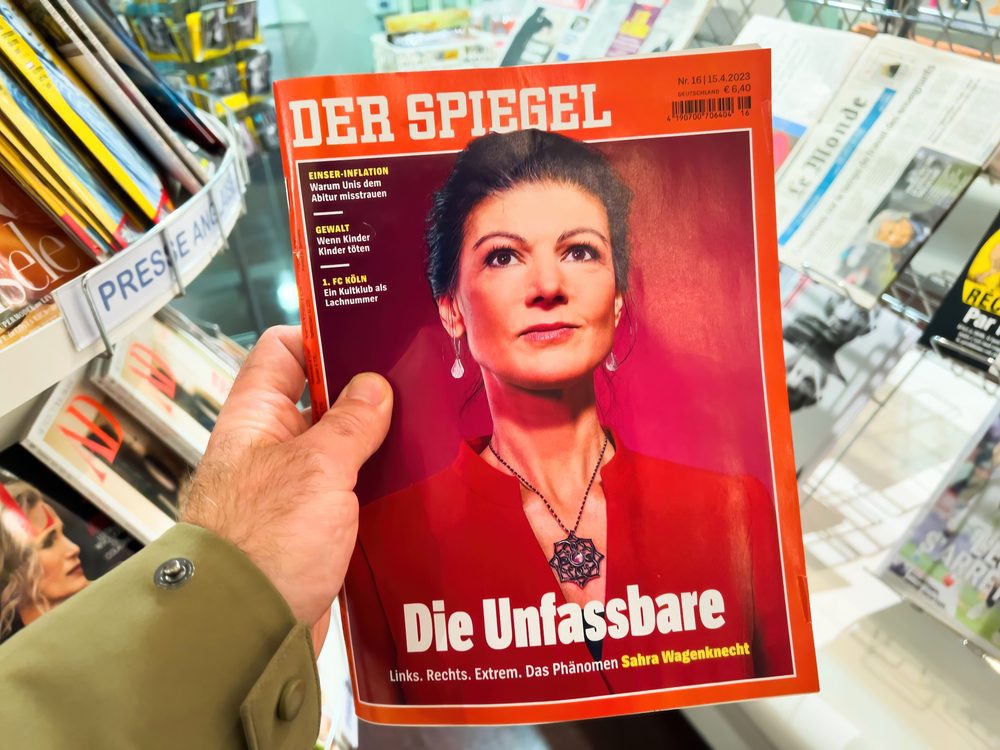
Hadrian / Shutterstock.com
A surprising new opinion survey has revealed that if Sahra Wagenknecht—the former parliamentary faction leader for The Left—were to form her own party and stand in Thuringia’s upcoming elections, it would siphon off votes from nearly every single party in the Landtag and become the largest force in the state.
The poll, carried out by Institute for New Social Answers (INSA) for the regional newspapers Thüringer Allgemeine, Thüringische Landeszeitung, and Osttüringer Zeitung, revealed that if elections were held this Sunday, the AfD and a Wagenknecht party would collectively garner 47% of the state’s vote.
THÜRINGEN | Sonntagsfrage Landtagswahl INSA/TA/OTZ/TLZ
— Deutschland Wählt (@Wahlen_DE) July 13, 2023
Szenario: Mit Liste Sahra Wagenknecht
Liste Wagenknecht: 25% (NEU)
AfD: 22% (-10)
LINKE: 18% (-4)
CDU: 16% (-4)
SPD: 9% (-1)
GRÜNE: 5%
…
Änderungen zur Umfrage ohne Szenario
Verlauf: https://t.co/su156YsLx8#ltwth pic.twitter.com/38c0Wz9nRb
Support for a Wagenknecht party and the AfD, according to the poll, presently stands at 25% and 22%, respectively. The Left, the party to which Wagenknecht currently still belongs, despite having been marginalized and demonized among fellow party members, would come in third place, collecting 18% of the state’s vote.
While the right-wing populist AfD stands to lose the most from a ‘Wagenknecht party’—whose political orientation would be left-wing populist, anti-woke, anti-mass migration, and anti-neoliberal—Thuringia’s AfD co-leader, Stefan Möller, spoke rather positively about the possibility of such a development.
Möller, commenting to journalists for Thüringer Allgemeine, admitted that a Wagenknecht party would almost certainly cost the AfD votes, but said a new party would mean “one more option” for the AfD. “When I look at Wagenknecht’s positions, a partnership with her seems the most likely,” Möller said.
Björn Höcke, Thuringia’s other AfD co-leader and the de facto leader of the party’s right wing, has previously called on Wagenknecht to leave behind The Left for the AfD. “I beg you, come to us!” Höcke said at a demonstration in Dresden in February.
The AfD isn’t the only party that stands to lose voters to a Wagenknecht party. The Left and the CDU would each lose 4%, while the former Left Party leader’s new party would take 1% from both the SPD and the FDP.
Wagenknecht, for some time now, has been among the most popular left-wing figures in German politics, despite being significantly out of step with her party, which over the years has become increasingly woke and left-liberal.
Her views align with the AfD’s on a variety of issues, including a staunch opposition to mass migration, which she rightly points out has had a disastrous effect on Germany’s working classes. Also, like AfD, she has consistently spoken out against arms deliveries to Ukraine and repeatedly called for peace negotiations with Russia so as to bring the war to a swift conclusion.
Alternatively, if Wagenknect does not form her own party and present a list for the 2024 Thuringian elections, the poll places the AfD, with its 32%, far ahead of any other party, with the next closest—The Left—at 22%. The CDU, SPD, the Greens, and the FDP, meanwhile would collect 20%, 10%, 5%, and 4% of the state’s vote, respectively.
THÜRINGEN | Sonntagsfrage Landtagswahl INSA/TA/OTZ/TLZ
— Deutschland Wählt (@Wahlen_DE) July 13, 2023
AfD: 32% (+4)
LINKE: 22%
CDU: 20% (-1)
SPD: 10% (-1)
GRÜNE: 5% (-1)
FDP: 4% (-1)
Sonstige: 7%
Änderungen zur letzten Umfrage vom 27. April 2023
Verlauf: https://t.co/su156YsLx8#ltwth pic.twitter.com/3PgfABdPBP
Whether or not a Wagenknecht party is formed and stands in Thuringia’s elections next year, the polling numbers speak for themselves and highlight the widespread, deep discontent with the status quo and mainstream establishment parties among the German population, which it rightly sees as wholly indifferent toward—and unwilling to address—their legitimate concerns as citizens.
